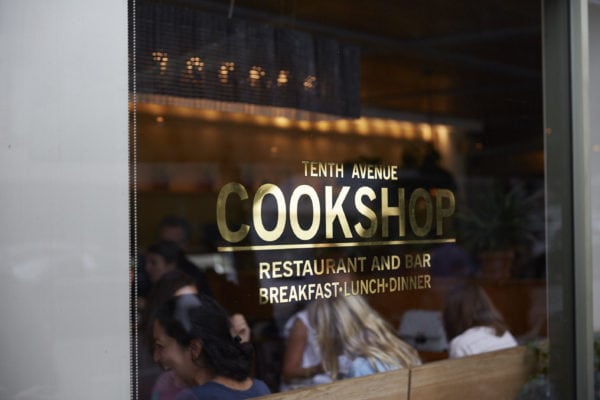CH-CH-CH-CHANGES
How Food Blogs Changed the Way We Eat Out
Last week, highly-respected and super smart food writer Josh Ozersky penned a NY Observer editorial, calling out New York’s blog culture for
fundamentally changing the way New Yorkers eat at restaurants. And by blogs, he’s referring to “news-driven niche sites for foodists.” (Thanks for eschewing the use of “foodie” there. #OneLessFoodie)
Anyone with experience in the commercial blogging space understand the — here quite literal — “feed the blog” feeling; it’s a numbers game, and you have to hit a quota of posts per day to satisfy invested parties (usually: advertisers, publishers who don’t understand how content works, an occasional misguided editor.) So, he argues, restaurants considered traditionally excellent by former standards (the Times, ill-fated Gourmet, for example) are eclipsed in this new model — passed over for newer, brighter, younger, hipper, different restaurants at an alarming speed. Blogs “valorize young, unproven chefs who are often jerks and are almost unequal to the demands of running a restaurant over the long term,” he says. Special menus, special events, even the most obvious gimmicks are fodder for posts, creating a food scene where the flashiest and loudest gets the attention.
To continue the restaurant industry/tech industry comparisons, this sentiment not unlike
Nick Bilton’s echo chamber piece in the
Times this week, positing that Silicon Valley creates new technology for Silicon Valley’s sake. At the end of the piece, respected restaurant industry New Yorkers conceded that they’ve accepted their “fate,” creating new restaurants every few years to feed the insatiable appetites after blog readers are fed post after post after post, some newsworthy; some not.
The piece makes other points, far more eloquently than mine here, and is absolutely worth a read.
BEEFLANDIA
Electronic Tracking from Field to Plate
Fifteen years ago, a tuberculosis outbreak among Michigan cattle prompted regulators to pass legislation requiring all cows to be electronically tagged, their movements and health monitored throughout their lifespan. This way, if an animal becomes sick, its entire life story can be tracked, including identifying any other animals it may have come into contact with. What farmers and food producers didn’t realize then — but do now — is that this system may prove useful in other ways: namely, tracking the entire health and lifespan of meat, from field to store to plate. This could be the industry’s future: electronic animal tags are converted to bar codes, bar codes are affixed to packaging of the actual animal’s meat in the grocery store. Ergo, anyone can trace the origins of their meat by scanning the packaging with their phone. Part real-life “Portlandia” skit, but mostly awesome, helping a larger magnitude of American consumers understand everything about the origins of their food.
UNLIKELY PARTNERSHIPS
Food52 + Rap Genius = Food Genius
RapGenius, the site that aims to make sense of rap lyrics by allowing crowd-sourced annotations (and later, Chapter One of Sheryl Sandberg’s
Lean In), has partnered with (amazing, wonderful, one of the best) recipe site Food52
to create Food Genius, a tool allowing cooks to annotate recipes and cooking articles online. In the early stages, Food52 editors will be the only contributors with access to the annotation tools, but eventually they’ll be opened up to the larger Rap Genius community. According to the recipe site, annotations will include photos of recipes at every step, ingredient substitutions for tate or special diets, and more uses that the community will surely discover later. Worth a look! Here’s the first recipe,
How to Make Any Meatballs in Five Steps.
FOIE
Hapa Ramen Pop-Up Sparks Twitter Rage
@linecook remains one of my favorites on the SF cooking and tweeting scene, but his Tweet last week mentioning a Hapa Ramen pop-up at brick-and-mortar restaurant Wing Wing SF wasn’t so well-received by everyone. In fact, it’s one of the best examples of “vegan retaliation” via Tweet you’ll see. I can’t figure out exactly what prompted the pretty extreme backlash; probably because a little bird mentioned
they’d be serving (banned-in-California) foie gras:
Feelings on foie gras aside, watching this level of interaction unfold via Tweet is completely new — thanks to this digital technology, we all have a window to the inside. And in instances like these, I’m so glad!
ANALOG
Why Printed Cookbooks Still Matter
Free digital recipe sites are a dime a dozen, but there are plenty that contain high-quality, expertly conceived, tested, well-planned recipes. So why bother with a dusty cookbook shelf?
Kaitlin Goalin, former National Editor at Tasting Table, shared
five solid reasons print cookbooks are still relevant with CNN’s Eatocracy. And even with access to hoards of free digital recipies and collections, I must agree. As does author Barbara Haber, who penned
a lovely piece defending her (paper) recipe-collecting passion.)
Digestifs
- The catbeards internet meme softens the blow of a bad Times review for April Bloomfield and Ken Friedman — Eater
- It’s delivery week in six on Seamless — lunch and dinner specials just like Restaurant Week, except delivered — Seamless
- The power of gorgeous food photography, illustrated by this Bouchon Bakery Tweet —@BouchonBakery
- The Hollywood Reporter takes a break from covering Hollywood acting talent to call out influential Los Angeles chefs. Interesting. — The Hollywood Reporter
- Mario Batali appears to be up to something at Tumblr — @MarioBatali


